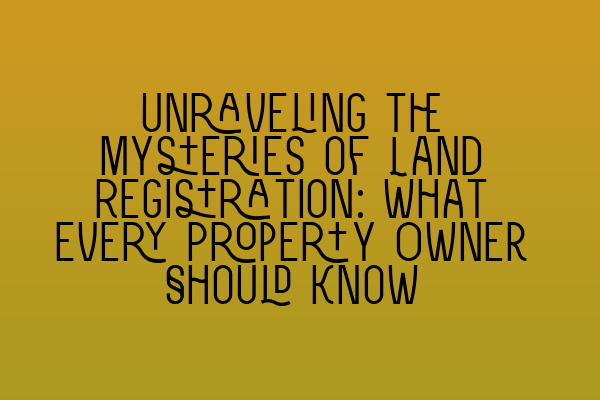Unraveling the Mysteries of Land Registration: What Every Property Owner Should Know
As a property owner, understanding the intricacies of land registration is essential to safeguarding your ownership rights and ensuring a smooth and secure transaction process. Land registration is the legal process of recording ownership and other important information about a property in an official register maintained by the Land Registry. In this article, we will unravel the mysteries of land registration and provide you with the key information you need to know.
Why is Land Registration Important?
Land registration is important for several reasons. First and foremost, it provides a clear and definitive record of ownership, which helps prevent disputes and uncertainties regarding property rights. It also makes it easier to transfer ownership, as the buyer can rely on the information provided in the register. Additionally, land registration plays a crucial role in protecting your property from fraud and ensures that any mortgages or charges against your property are properly recorded.
The Land Registry
The Land Registry is a government agency responsible for maintaining the official register of land and property ownership in England and Wales. It keeps track of all registered properties and records important information such as ownership details, boundaries, and any rights or interests affecting the property. The Land Registry operates an online portal that allows property owners, buyers, and professionals to access this information quickly and easily.
The Process of Land Registration
When you become the owner of a property, whether through purchase, inheritance, or any other means, it is important to register your ownership with the Land Registry. The process involves completing an application form and providing supporting documentation, such as proof of identity and evidence of ownership. The Land Registry will then review the application and, if everything is in order, register you as the new owner of the property.
It is worth noting that not all properties are registered with the Land Registry. Some older properties may still be unregistered, which means that ownership is evidenced by the title deeds rather than the official register. If you own an unregistered property, it is advisable to consider voluntary registration to benefit from the added security and simplicity that registered properties offer.
Understanding the Title Register
Once your property is registered, you will receive a title register. This document contains important information about your property, including your name as the registered owner, a description of the property, any rights or interests affecting the property (such as mortgages or easements), and details of any restrictions or covenants that apply. It is crucial to review the title register carefully to ensure that the information is accurate and reflects the current situation.
Charges and Restrictions
When reviewing the title register, pay close attention to any charges or restrictions that may affect your property. Charges, such as mortgages or other loans secured against the property, will be recorded in the register. It is important to ensure that you are aware of any financial obligations associated with these charges and that they are discharged when they are paid off.
Restrictions, on the other hand, are conditions or limitations imposed by the previous owner or a third party that affect the property. They can include restrictions on use, alterations, or the requirement to obtain consent before undertaking certain activities. It is important to understand these restrictions and ensure compliance to avoid any potential legal issues in the future.
Rectifying Errors in the Register
In some cases, the information in the title register may contain errors or inaccuracies that need to be corrected. If you identify any mistakes, it is important to take immediate action to rectify them. The Land Registry provides a mechanism for correcting errors through an application called an “application for alteration of the register.” This involves providing evidence to support the requested changes and paying the applicable fees.
Conclusion
In conclusion, understanding land registration is crucial for every property owner. It provides clarity and security regarding ownership rights, simplifies the transfer of ownership process, and protects your property from fraud. By familiarizing yourself with the land registration process, reviewing your title register, and being vigilant about any charges or restrictions, you can ensure that your property rights are safeguarded. If you need assistance with land registration or have any questions, consult with a qualified property solicitor for expert advice.
Related Articles:
- Understanding Contractual Capacity: Rights and Limitations
- Interactive SQE Mock Tests for Contract Law: Test Your Knowledge
- Join Our SQE Contract Law Webinars: Expert Insights and Guidance
- SQE Prep: Mastering the Essentials of Contract Law
- Contractual Capacity: Understanding Legal Competence in Contracting Parties
